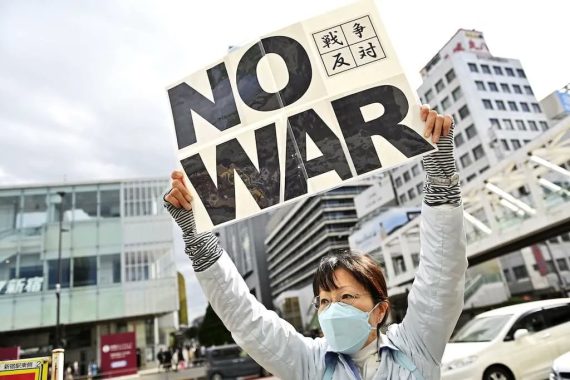Japanese policy-makers have jumped at the Ukraine crisis as an opportunity to boost the country’s credentials as a reliable member of the Western alliance—a goal stated clearly at every juncture. Japan was quick to adopt sanctions in line with the United States, and has stressed at every turn that it stands shoulder to shoulder with its international partners in the West.
Japan at first balked at the prospect of stopping the import of Russian oil, but by that time so had the Europeans, so clearly a calculation was made that Japan would not stand out on that issue. Japan also quickly changed its restrictions on weapons exports (which had prohibited exports to a country engaged in conflict) to allow it to send defensive equipment such as bulletproof vests to Ukrainian forces.
Japan even announced it would admit refugees from Ukraine, a significant move since for decades the country has been criticized for flouting international norms of refugee protection—and was criticized by G7 partners for its stated reluctance to accept Syrian refugees during the 2015 crisis.
As of March 13, 2022, the number of Ukrainian refugees brought to Japan totaled a paltry 47 persons, but the political will appears clear.
The Ukrainian crisis as an opportunity for Japan
That Japan would see the Ukrainian crisis as an opportunity is not surprising. Geographically far from the fighting, the chances of Japan being destabilized from the conflict are slim. Economic relations with Russia are meaningful in terms of oil and other energy resources, but Russia is far from being a major source for Japan, with the country relying on West Asia for nearly 90 percent of its oil.
Bilateral relations are dominated by the dispute over the Kuril Islands, which Japan insists on referring to as the “Northern Territories,” but negotiations on that issue have been going nowhere for some time. On that front, a weakened Russia can only benefit Japan.
More to the point, however, the Japanese political elite has banked heavily on the military alliance with the United States, as a bulwark against China and a means towards regaining economic hegemony in the region. Those who honestly think that China is a national security threat believe that only the Americans can and will protect Japan. Recent initiatives including countries such as the UK and Australia (Quadrilateral Security Dialogue) are important, but Japan is not really hedging its bets.
Japan and the United States
To the people in power in central Tokyo, the U.S. remains the only game in town, and any suggestion that the Americans are not happy with Japan in any way has always been a cause for desperate scrambling and immediate changes. Keeping the Americans happy has been the ultimate policy goal throughout the postwar era.
And Japan has bent over backwards to do just that. The country, mainly the islands of Okinawa, is home to 131 U.S. military bases, housing a total of 62,000 soldiers and military contractors. U.S. bases and troops enjoy wide-ranging immunities from Japanese law that do not exist in other countries which also host American bases. This situation was remedied to an extent after public outrage over a rape case in 1995, but it is still widely suspected that the authorities treat cases of U.S. troops with kid gloves.
When American warplanes crash into civilian areas, the area is cordoned off by U.S. military personnel, with Japanese police unable to enter the scene—and the Japanese media use tortuous terms like “unplanned landing.” Indeed, in the case of armed conflict, the Japanese military will even be incorporated into the U.S. command structure, and be subject to orders by American commanders.
The notion that the Americans are in Japan to protect the country (allowing the people to live in peace and the country to engage in economic pursuits) is dominant throughout the public discourse. Of course, that is only part of the picture: the U.S. military uses Japan as a springboard for military operations not only in the Pacific, but also in Afghanistan, Syria, and other areas of West Asia—facts which are rarely raised.
U.S. warplanes enjoy exclusive access to airspace over central Tokyo, forcing commercial aircraft to take a roundabout route towards the airport, and often hold dangerous training exercises above the city without the consent or even the knowledge of the Japanese government. For these dubious privileges, Japan pays the United States what is euphemistically called the “omoi-yari” (kindness or compassion) budget, amounting to almost $10 billion over the 2022-2026 period.
Particular excesses of U.S. forces in Japan have been subject to public criticism, and at times the government has taken action; however, fundamental questions are rarely asked. Some commentators have noted that members of the Japanese elite who dare to raise objections to the military alliance are instantly excluded from the mainstream. Like many colonized countries, the ruling class in Japan has vested interests in maintaining the status quo.
Recommended
The same mistakes of WWII?
This relationship of fealty permeates throughout much of Japanese policy-making, and has become even more extreme in recent years, in particular during the reign of PM Shinzo Abe from 2012 to 2020. An overt right-wing ideologue, Abe’s premiership was characterized by numerous controversial “reforms” aimed at remilitarization and the oppression of dissent, including laws rammed through parliament that made it easier for the military to operate abroad—together with the Americans, of course.
Many Japanese were horrified that the country might be repeating the same mistakes that led to WWII. There definitely is that danger, but the fact is that any talk of remilitarization in the postwar era is aimed solely at making a larger contribution to the U.S. alliance, not independent action by Japan.
For all its faults, the Japanese right wing through WWII comprised of true nationalists: they believed that Japan needed to defend its independence, through both diplomatic and military means. The political elite now, on the other hand, is content to have Japan remain a virtual vassal state of the U.S. Indeed, it seems incapable of even contemplating a situation where that is not the case.

VIDEO: Russian Expansionism under Vladimir Putin
Will the United States protect Japan?
That may have made political sense for Japan and the region up till now, during the Pax Americana. However, one important lesson to be learned from the Ukraine crisis—as well as from the fallacy of the United States’ endless wars in West Asia, and from the four years of the Trump presidency—is that the Americans may no longer deliver on their promises.
It may be true that the U.S. has a treaty obligation to protect Japan should the country be invaded, whereas there were never any concrete assurances of protection or even NATO membership to Ukraine (publicly at least). However, it is clear that the U.S. egged the Ukrainians on, and anyway treaties are only as meaningful as the political will to implement them.
The Japanese political elite needs to reassess its strategy—and Japanese who naively believe that the Americans will always be there for us need to take a long, hard look at the situation. Banking on the Americans may no longer be a winning proposition.





